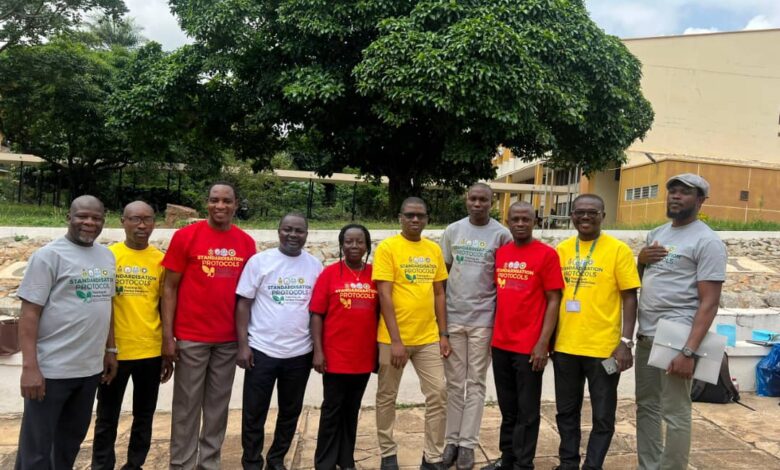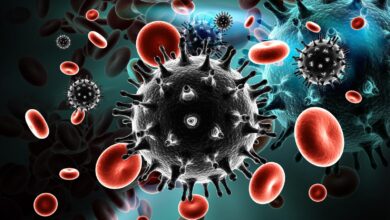
Background:
Kwame Nkrumah University of Science and Technology (KNUST) is a leading pharmaceutical education and research institution in Africa, committed to advancing healthcare through innovation and collaboration.
In a landmark collaboration to strengthen Africa’s herbal medicine sector, KNUST partnered with Nigeria’s University of Lagos (UNILAG) to deliver a pioneering three-day workshop on Herbal Medicine Standardization and Quality Control from July 8th to 10th, 2025.
Details:
The training, hosted by the Department of Pharmaceutical Chemistry was initiated by a formal request from UNILAG’s African Center of Excellence for Drug Research (ACEDHARS).
The aim was to equip technologists and researchers with cutting-edge techniques to ensure the safety and efficacy of herbal products.
A Collaboration of Cutting-edge Scientific Stride:
The workshop was catalyzed by a June 2025 letter from UNILAG’s Prof. Omobolanle Ade-Ademilua to KNUST’s Prof. Isaac Ayensu, seeking expertise to address gaps in herbal medicine standardization.
“We believe KNUST, as a leader in pharmaceutical sciences, is the ideal institution to deliver this training,” wrote Prof. Ade-Ademilua, highlighting the need for capacity building in Phytochemical Screening, Good Manufacturing Practices (GMP), and Regulatory Compliance.
The carefully selected Nigerian Technologists were led by Ishola Ismaila Ogunbayode, an Associate Professor from the Department of Pharmacology, Therapeutics and Toxicology, College of Medicine, UNILAG.
The collaboration underscores a shared vision: to combat inconsistent quality, contamination, and weak regulations plaguing herbal medicine across Africa.
Prof Isaac Ayensu(Ghana):
“Only 7 of 54 African nations have microbial standards for herbal products,” noted Prof. Ayensu during the opening session.
“This training is a step toward changing that narrative.”
Bridging Tradition and Modern Science:
Herbal medicine, a cornerstone of healthcare for over 80% of Ghana’s population, faces challenges such as inconsistent quality, contamination, and lack of regulatory oversight.
The workshop aimed to harmonize traditional knowledge with modern scientific practices, ensuring herbal products meet international safety and efficacy standards.
Professor Isaac Ayensu, Head of the Pharmaceutical Chemistry Department, underscored the urgency of standardization:
“Until a herbal drug is standardized, it cannot be deemed safe for patients. Our goal is to integrate rigorous quality control measures—from raw material sourcing to final product testing—to protect public health.”
Key Themes and Innovations:
The workshop covered five pillars of Good Manufacturing Practices (GMP):
1. Quality Control and Phytochemical Screening
o Hands-on sessions demonstrated techniques like Thin Layer Chromatography (TLC) and High-Performance Liquid Chromatography (HPLC) to identify and quantify active compounds in herbs such as Nauclea latifolia and Morinda lucida.
o Professor Isaac Kingsley Amponsah highlighted the importance of batch-to-batch consistency: “Without standards, herbal products risk contamination or therapeutic failure.”
2. GMP Compliance:
Dr. John Addotey outlined WHO guidelines, emphasizing facility design, personnel hygiene, and documentation. “Adhering to GMP prevents contamination and ensures every product is traceable,” he noted.
Dr. Joseph Adu emphasized the need for appropriate Facility Design, Equipment, and Personnel Hygiene in GMP compliance.
3. Advanced Analytical Techniques
Lecture on Analytical Techniques for Herbal Medicines (HPTLC, HPLC, UV-Vis, GC-MS) was delivered by Prof. James Oppong Kyekyeku. Led by Prof. Edmund Ekuadzi, the participants toured KNUST’s Central Laboratory, equipped with cutting-edge equipment like Atomic Emission Spectroscopy and Nuclear Magnetic Resonance (NMR) for heavy metal detection and compound identification and analysis respectively.
4. Regulatory Documentation
o Professor Samuel Oppong Bekoe stressed: “If it isn’t documented, it never happened.” Proper records are vital for regulatory approval and consumer trust.
5. Collaborative Problem-Solving
o A Problem-Based Learning (PBL) session facilitated by Dr. Abena Brobbey addressed real-world challenges, such as raw material variability and facility upgrades. Solutions included adopting Good Agricultural Practices (GAP) and investing in staff training.
Voices from the Ground
• Prof. Isaac Kingsley Amponsah (KNUST): “Standardization isn’t just science; it’s a commitment to public health.”
Dr. Basheeru K.A. (UNILAG):
“This partnership fills critical gaps in Nigeria’s herbal medicine sector. We’re taking these protocols home.”
Nejatu Gandhi Adams, Participant:
“This training bridged the gap between theory and practice. I now understand how to ensure herbal products are safe and effective.”
Local and Global Impact
The workshop also spotlighted Africa’s regulatory gaps.
Only 7 of 54 African countries have microbial standards for herbal medicines, leaving consumers vulnerable to unsafe products. Participants called for:
• Stronger regulations aligned with WHO benchmarks.
• Industry-academia partnerships to scale up GMP adoption.
• Public awareness campaigns to highlight the risks of non-standardized herbs.
Next Steps
The workshop concluded with a call to action;
Policy Advocacy:
Harmonize herbal medicine regulations across Africa.
Continued Collaboration: Expand training programmes to other regions.
Public Awareness:
Educate consumers on the risks of non-standardized products.
Prof. Ayensu announced plans for an annual workshop, adding, “This is the dawn of a pan-African movement for quality herbal medicine.”
Charge:
Stakeholders urge governments and industry leaders to invest in standardization infrastructure consistent with WHO guidelines.
Story By Michael Ofosu-Afriyie, Kumasi.



